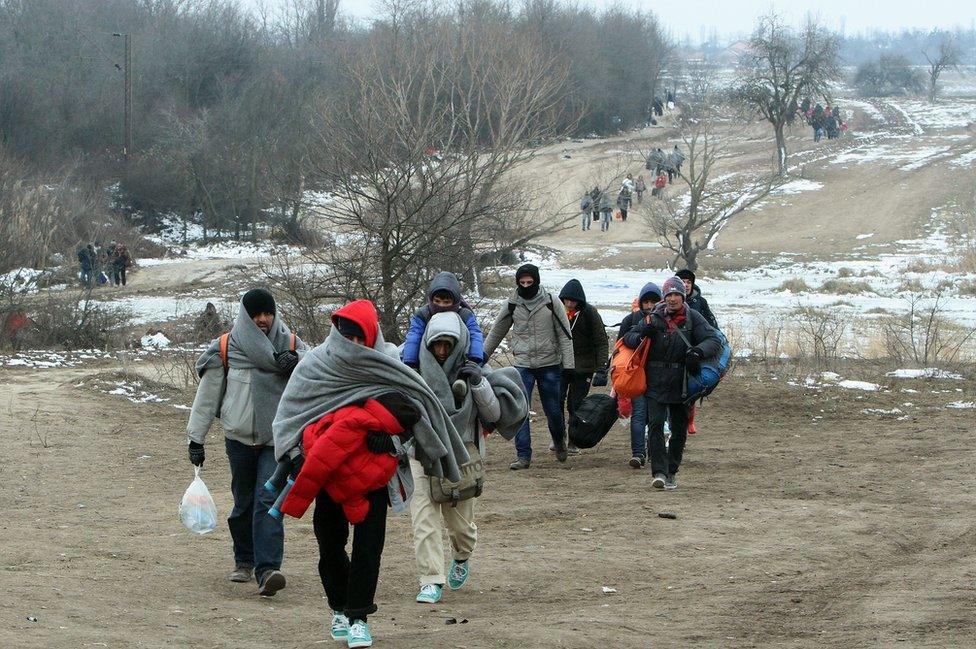Migrant crisis: EU seeks more controls for Schengen borders
- Published

Migrants are braving icy weather on the Macedonia-Serbia border, hoping to reach Germany
Several EU states plan to prolong their temporary border controls for as much as two years, because many migrants are continuing to head north from Greece.
The announcement came after a meeting of EU interior ministers in Amsterdam.
The temporary border controls imposed by Austria and Germany are set to end in May. But they can get EU permission to extend the controls until 2018.
The migrant crisis has put the Schengen passport-free travel zone at risk. Most migrants want to settle in Germany.
Article 26 of the Schengen Borders Code, external allows states to keep temporary border controls in place for a maximum of two years, "in exceptional circumstances".
Schengen: EU free movement deal explained
"Member states invited the [European] Commission to prepare the legal and practical basis for the continuance of temporary border measures through Article 26," said Dutch Migration Minister Klaas Dijkhoff, after the Amsterdam talks.
A Commission proposal to that effect is expected to be presented to EU leaders at a Brussels summit next month.
Greece criticised
An estimated 1.1 million migrants reached Germany last year - most of them refugees from the conflicts in Syria, Iraq and Afghanistan.

Before the ministers' meeting Austria's Interior Minister Johanna Mikl-Leitner warned that Greece might be excluded from the Schengen zone if it failed to put more resources into curbing the migrant influx.
Interviewed by Germany's Welt am Sonntag newspaper, she said that "if the Athens government doesn't in the end do more to protect the [EU] external borders, then we'll have to openly discuss a temporary exclusion of Greece from the Schengen zone".
But Commission spokesperson Natasha Bertaud dismissed that idea in a tweet, external, which said: "No one talking about a 'suspension of' or 'exclusion from' Schengen - no such possibility exists. We will save Schengen by applying Schengen."
German Foreign Minister Frank-Walter Steinmeier also scorned the idea of Greek expulsion from Schengen as a "pretend solution".
Besides Germany and Austria, four other Schengen states have put temporary border controls , externalin place: Denmark, France, Norway (not an EU member) and Sweden.
Schengen - seen as a cornerstone of EU freedom - comprises 22 EU members and four non-EU countries.
More than 30,000 migrants have already reached Greece from Turkey by boat this year, despite the cold weather and rough seas.
Greece - with many islands lying near the Turkish coast - is the main entry point, and is overwhelmed by the numbers.
Macedonia pressure point
Some 108,000 migrants arrived in Greece in December, the EU border agency Frontex said.
Macedonia - not in Schengen - is only letting through migrants whose Greek registration papers show their final destination to be Germany or Austria.
Slovenia - one of the countries on the Balkan migration route - has urged its EU partners to provide "maximum assistance to the Macedonian authorities" by sending border police and equipment to deal with the crisis.
The ministers' agenda also included a European Commission proposal to revamp Frontex by creating a new European Border and Coast Guard, external, with a stronger mandate to intervene.
According to the proposal, a member state would have to allow the force to deploy on its territory if the Commission decided that such a deployment was urgently required.
The country concerned would also have to co-ordinate its operations closely with the EU border guard force.
Katya Adler: Germans struggle to cope with influx

Where Europe is failing on migrants

The 28 member states have not agreed on an EU-wide mechanism for relocating migrants, meant to ease the burden on Greece and Italy. Only small groups have been relocated so far - and several states in Central and Eastern Europe refuse to accept migrants
The Schengen agreement on freedom of movement is in jeopardy - Hungary fenced off its borders with Serbia, Croatia and Slovenia; meanwhile Germany, Austria, Denmark, Sweden, Norway and France also reimposed border controls
The Dublin regulation is not working effectively. Countries are no longer sending back migrants to their first point of entry to the EU
Thousands of migrants - many of them Syrian war refugees - still arrive daily from Turkey
Processing of asylum applications is slow and there is a big backlog - so reception centres are overcrowded
Germany - the main destination for migrants - is rethinking its open-door policy, partly because of outrage over assaults on women in Cologne at New Year
